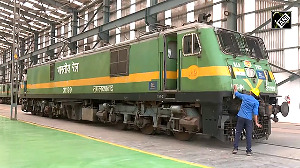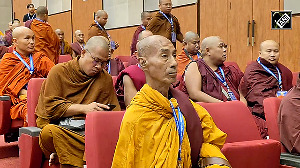Two millennia ago, the Arthashastra of Chanakya and Panchatantra of Vishnu Sharma enjoined extreme caution on a ruler when suddenly emissaries from another country descended upon him flattering him to the skies and ardently pressing him to join in a venture. The authors of both the treatises were aware that in all such cases, it was not what was explicit but what was implicit that mattered, and the art of diplomacy lay in giving to the emissaries the satisfaction of having had their say, while not swerving from the paramount duty of safeguarding the nation's interest.
One hopes that the India's National Security Advisor M K Narayanan, and Foreign Secretary Shiv Shankar Menon, with whom the US Special Envoy for Afghanistan and Pakistan (fused into a new diplomatic concoction Af-Pak), Richard C Holbrooke, and the Chairman of the US Joint Chiefs of Staff, Admiral Mike Mullen, had parleys on April 8, would have borne in mind this age-old wisdom.
Inexplicable forbearance
It is patent, though, to the observers of the pattern of behaviour of the pivotal office-holders, from the Prime Minister Dr Manmohan Singh downwards, of the present power structure in New Delhi that they are for aligning India's policies with those of the US. The entire saga of the nuclear deal, the stand on Iran, the joint defence exercises, Dr Singh's smothering of George W Bush with the love of the entire Indian people and generally, the deafening silence seemingly signifying consent in respect of the moves of the US which would have, in other times under other dispensations, evoked vocal opposition, bear testimony to the desire of India under the present dispensation to march in step with the US to the maximum extent possible.
The ministers and the mandarins in the government at New Delhi have shown inexplicable forbearance without openly expressing their concern in regard to, for example, the worrisome uncertainty over H1B visas, the pronounced tilt towards protectionism, denial of tax concessions for companies in US engaging foreign employees, placating Pakistan despite its flagrant defiance of UN resolutions for countering terrorism, and rubbing in where India stood in the US calculations by dropping it from the itinerary of the first trip to South Asia by the US Secretary of State, Hillary Clinton.
This is not to suspect their motives. They may be entirely honourable in that they have come to the conclusion for reasons they consider justifiable that strategic partnership with the US, overlooking any grating aspects of its policies, is conducive to the best interest of India. If so, the government owes it to the people of the country to clearly spell out the reasons which could, then, form the basis for a meaningful nation-wide debate. In view of the Congress party having been the dominant constituent of the United Progressive Alliance, the occasion of the imminent election to the Lok Sabha affords its spokespersons, especially Foreign Minister Pranab Mukherjee, an opportunity to take the electorate into confidence as to the background to the soft corner the government has for the US.
Be that as it may, one is unable to make out the circumstances that have compelled Holbrooke and Admiral Mullen to come calling at a time when there is a possibility of a new government being in place in about a month. What was the point in taking all the trouble "to consult and inform India", that is, Narayanan and Menon, to be specific, when there was at least a notional chance of their not being there in four weeks' time?
Strange timing
No such visit was necessary merely to inform India and the world, as Holbrooke did at the media meet, that India was a 'vital' leader in the region, and 'absolutely critical' in playing a constructive and positive role, or tell a lame duck government that "We cannot settle Afghanistan and many other world problems without India's full involvement". These are all platitudes and truisms.
The strange timing of the visit leads inevitably to the question whether there is more in it than meets the eye. Can it be that the Americans wanted to press on the government, regardless of its electoral fate, demands that they felt could not wait and that somehow they could bring the government round to comply with them and leave the fait accompli for the successor government? Can it also be that they were gambling on the possibility of the continuance of the present team under Dr Manmohan Singh after the election and hoping to benefit from the thrust given now in furtherance of their so-called Af-Pak strategy? If so, what parts of that strategy lend themselves to the ground to be prepared in Delhi to achieve the American objectives of eliminating the Al Qaeda and the Taliban, pressuring Pakistan to rub terrorist groups out of existence from its soil so that they no longer pose a threat to US security and extricating the US from the quagmire of Afghanistan?
In the eyes of the Americans, this will call for prevailing upon India to make a substantial contribution of troops to a long talked about surge into Afghanistan, allaying Pakistan's fears about its flanks being exposed to India's powerful presence in Afghanistan brought about by means of its developmental projects and helping Pakistan focus on a fight to the finish against terrorists breeding and operating on the Pakistan-Afghanistan border which Obama has described as the world's most dangerous place.
Siege psychosis
All the three components of the Af-Pak strategy will not take off unless India is brought round to the US line of thinking. Bolstering Pakistan at all costs, even if it be by throwing good money after bad, has become an obsession with the US because it has worked itself into believing that that country, as per the ominous prediction of the Atlantic Council, an American think-tank, might face "internal collapse" within six months, leading to rabid jehadi terrorists swarming all over the globe and the Pakistani nuclear button becoming theirs for the pressing.
Nothing will suit the US better than if, somehow or the other, India could be made to demonstrate its solidarity with the US by joining the 'surge' in Afghanistan, make room for other players, the US and other industrial countries, perhaps, in building up Afghanistan to lessen Pakistan's 'siege psychosis' centering on India and turn the fixation of Pakistan away from Kashmir and get it going with the implementation of the Af-Pak strategy on its Western borders.
For all the denials and protestations, there is every possibility that this was the mission of Holbrooke and Admiral Mullen during their recent recent visit to India. Right or wrong, there is a buzz that Holbrooke is inherently sympathetic to Pakistan's susceptibilities. Pakistan, as per the columnist of Islamonline.net, has been 'delighted' by Holbrooke's appointment as Special Envoy and its Foreign Office spokesperson is on record hailing it as the harbinger of peace and stability in the region. Holbrooke is also known as 'the bulldozer' for his hard-hitting way of conducting business and for not taking no for an answer.
In the interests of public accountability and transparency, as also to avoid any future controversy, Narayanan and Menon should, with the permission of the government, come out with what actually transpired during their elaborately set-up discussions on the eve of election with Holbrooke and Admiral Mullen.







 © 2025
© 2025